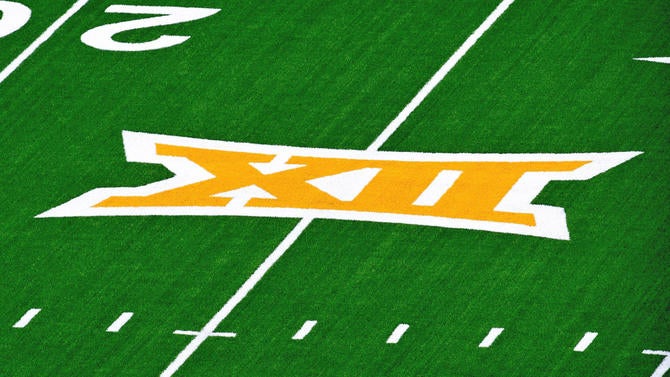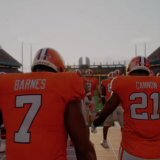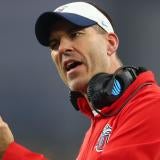The Big 12 board of directors took an unusual position June 22 by publicly requesting "once again" for Baylor to provide the conference with all information from investigations into rapes at the university. It's rare to see a conference publicly demand such information from one of its members. Then again, some of the chain of events at Baylor have been unusual, too.
What transpired at Baylor, both before and after the university released some findings from an investigation, caused serious concern among some Big 12 presidents about potential NCAA violations and how deep the scandal goes, according to three conference sources who requested anonymity to speak on the matter.
The Big 12 told Baylor it needs to satisfy the conference's presidents that the school has made the necessary structural changes to avoid another major scandal. Some Big 12 presidents are concerned Baylor's governance problems may go all the way up to a minority number of its board members, but they believe interim president David Garland wants to clean up the university and is receptive to the Big 12's help, according to sources.
On May 26, Baylor's board of regents released a 13-page "findings of fact" from its law firm, Pepper Hamilton, that strongly criticized Baylor's football coaches without naming them individually or providing specifics. The report said the coaches repeatedly failed to prevent and report misconduct and created a "risk to campus safety," and that Baylor had "a cultural perception that football was above the rules." Baylor suspended coach Art Briles with the intent to fire him and accepted the resignations of president Ken Starr and athletic director Ian McCaw.
Concerns deepened within the Big 12 on June 14 when reports surfaced that Baylor's board planned to vote on possibly bringing Briles back as coach in 2017 after a one-year suspension. Garland told Dallas TV station WFAA that he was "really caught off guard by all this" and that a meeting was scheduled for a different issue.
On June 16, Briles' attorney filed a court motion accusing Baylor's attorneys of acting disingenuously on his behalf in a Title IX lawsuit. A woman says Briles and other Baylor officials ignored her claims that she was raped by former football player Tevin Elliot, who was later convicted and sent to prison. In the June 16 court filing, Briles suggested he could soon sue Baylor for a number of claims, including wrongful termination, fraud, libel and slander, and negligence.
One day later, Baylor and Briles reached a settlement over the coach's contract that the two sides confirmed publicly on June 25. The timing of how quickly Baylor settled Briles' contract after his legal threat against the school also concerned some Big 12 presidents, sources said.
In an interview this week, Big 12 commissioner Bob Bowlsby said he has had a couple conversations with Baylor about the Big 12's efforts to obtain information and the university has "responded appropriately given the circumstance." Bowlsby cautioned that the Big 12 is "very early" in a process that will likely take a while.
"They have indicated they'll be as forthcoming as they possibly can, realizing there are pending legal issues for them," Bowlsby said. "I'm sure that will mitigate some of what they can disclose."
In a statement provided by Baylor spokeswoman Tonya Lewis, the university said Garland met with Bowlsby and is continuing discussions with the Big 12 for additional information.
"Dr. Garland did reiterate that the Findings of Fact is the complete report and fully reflects the themes, core findings and failings identified in the investigation -- while omitting the documentation of individual cases and names supporting these findings," Baylor said in the statement. "Baylor's board of regents chose to publicly release severely critical Findings of Fact because it believes it is in the best interest of the Baylor community to do so, regardless of the impact on current or potential civil litigation or regulatory action."
Garland told WFAA on June 14 that Baylor could not release even a redacted version of the findings with pertinent details because the university doesn't want to re-traumatize the survivors. "It's a small community," Garland said. "People can tell."
Baylor's history of scandals has many Big 12 schools wondering what, if any, NCAA violations the university committed by covering up sexual assaults, sources said.

Since 2000, Baylor has had three major NCAA infraction cases, including academic fraud and a former men's basketball coach covering up extra benefits by portraying a murdered player as a drug dealer. Those violations resulted in Baylor men's basketball receiving a postseason ban and playing a shortened regular season. Most recently, Baylor was cited by the NCAA in 2012 for failure to monitor the men's and women's basketball programs due to impermissible benefits and other recruiting violations.
There are questions within the Big 12 about whether its schools have been disadvantaged in the past, and perhaps still to this day, if Baylor violated NCAA rules. Baylor said it voluntarily contacted the NCAA.
How Baylor's cover-up of sexual assaults might have violated NCAA rules is potentially a slippery slope. The NCAA tried this with Penn State regarding the Jerry Sandusky child molestation scandal and it backfired. The penalties did little to heal Sandusky's victims and ultimately some of Penn State's punishment ended early due to litigation.
Bowlsby said examples of violations in a case such as Baylor's could include players receiving legal assistance for free, impermissible transportation to meet legal obligations, and a university not complying with its own disciplinary policies. "But it's far too early in the process to draw any conclusion on those things," Bowlsby said.
The Big 12 is trying to walk a fine line over what information it can receive from Baylor, a private university that has said there is no written report from Pepper Hamilton to produce. That answer has been met with skepticism by some Big 12 schools, who believe no written report exists only if a university requests that no written report exists, sources said.
The Big 12 said it requested "all documents associated with the investigations of sexual assaults at Baylor. This request is for written materials as well as any information that has been conveyed orally to University leadership or to its board of regents including, but not limited to, the unedited written or verbal information from Pepper Hamilton, omitting only the names of any involved students. Internal documents pertinent to the investigation have also been requested."
When asked if the Big 12 believes it can compel Baylor to provide the information, Bowlsby replied, "We certainly don't have any legal standing, but our bylaws are clear that our institutions are expected to conduct their athletic program within institutional control in compliance with Title IX, among other things. There are parts of this that we have no province at all, and parts of it we have direct interest and we need to satisfy ourselves on the latter. There's a legal process that's going on with these sexual assaults and we don't have any legal standing."
The Big 12's bylaws allow for a member to be sanctioned by a supermajority vote from the conference's board of directors. Among the reasons the Big 12 could penalize a school is if it violates any conference rules or "engaged in any action or a course of conduct materially adverse to the best interests of the Conference taken as a whole." The bylaws list examples of penalties, such as restrictions on postseason events, TV appearances, revenue distributions, and scholarships.
When asked if the Big 12 might sanction Baylor, Bowlsby replied, "I'm not going to speculate on that. It's too early in the process to begin drawing conclusions or define the landscape. Besides that, it's the board's responsibility and prerogative on that."
Baylor said in its statement: "Baylor remains confident in the actions it has taken to ensure improvement in student safety and to help restore confidence that its priorities and values remain in the proper order. We hope to not only apply what we learn and to approach the highest levels of prevention, response and support for students impacted by these acts, but also to share what we learn with other higher education institutions for the benefit of students everywhere."






















